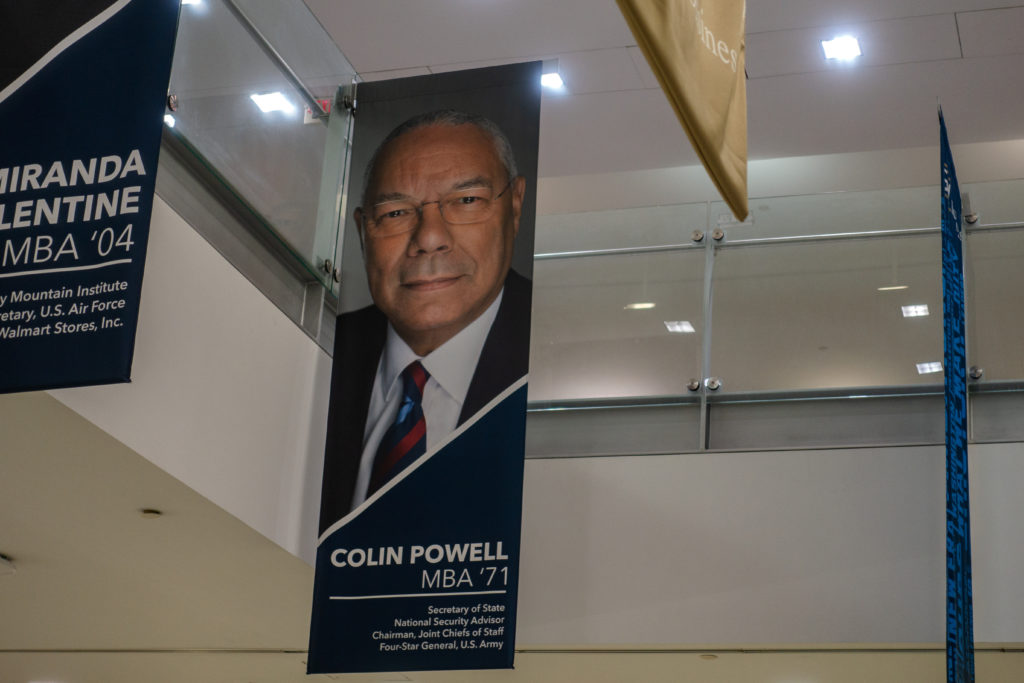Colin Powell, the first Black U.S. secretary of state and a GW alumnus, died of COVID-19 complications Monday. He was 84.
Powell attended the School of Business and received a master’s degree in business administration in 1971 before going on to serve in the White House. Powell, a two-time recipient of the Presidential Medal of Freedom, served as secretary of state under former President George W. Bush and during part of the Iraq War, previously acting as the National Security Advisor and the chair of the Joint Chiefs of Staff.
The University honored him as one of its Monumental Alumni as part of this year’s bicentennial celebrations. University President Thomas LeBlanc said the GW community was “fortunate” to learn from Powell’s world knowledge and experiences, and he will serve as an inspiration for students, faculty, staff and alumni. He said the GW community shares its condolences with the late federal official’s family.
“General Powell is remembered for his deep commitment to public service, particularly as a veteran and as a leader in national security, diplomacy and foreign policy,” LeBlanc said in a release.
Powell also earned an Honorary Doctor of Public Service award in 1990 and presented GW alumna and Sen. Tammy Duckworth, D-Ill, with the Colin Powell Public Service award during the Celebration of Service in October 2009.
“Saddened to learn Gen. Colin Powell passed away this morning,” Duckworth said in a tweet Monday. “My thoughts go out to his family and loved ones during this difficult time.”
Frank Sesno, the director of strategic initiatives in the School of Media and Public Affairs, said he covered Powell’s tenure as the U.S. national security advisor when he worked as a White House reporter for CNN, forming a professional relationship with Powell that would last for more than three decades. He said he interviewed Powell when the late official came to campus to promote his second book in 2014.
He said he “trusted” and respected Powell as a source because he showed interest in and care for the lives of everyone he came across.
“What I loved about him was that he was very much part of the Washington power elite, but he didn’t buy into it,” Sesno said.
Sesno said Powell always looked out for the wellbeing of others and was one of the few people he could call “exemplary” in the District. He said Powell set a “commander’s rule” in meetings where he would talk for 30 percent of the time so he could listen for the remaining 70 percent.
“His favorite question was simply, ‘How you doing?’” he said. “He used questions to think strategically, to challenge conventional wisdom and to look over the horizon.”
Sesno said despite Powell’s regrets of past mistakes, like advocating for U.S. involvement in the Iraq War, he showed “remarkable” candidness in talking about how that left a “mark” on his record as a public service official. He said Powell was honest and sincere in trying to keep the public informed.
“The impact he had on me was to show that people at the highest levels of authority can have integrity, have a sense of humor and take themselves very seriously, but not see themselves as above it all,” Sesno said.
John Olds, a former chairman of GW College Republicans and an alumnus, said the world needs more service-oriented leaders like Colin Powell, a “remarkable” example of a public service official.
“When I was chairman of @GWRepublicans, we invited Colin Powell, a @GWtweets alumnus, to speak at an event,” Olds said in a tweet Monday. “He declined, as his health was declining, but I will never forget the fact that he sent a hand-written note sending his regrets and wishing us luck. May he rest in peace.”





